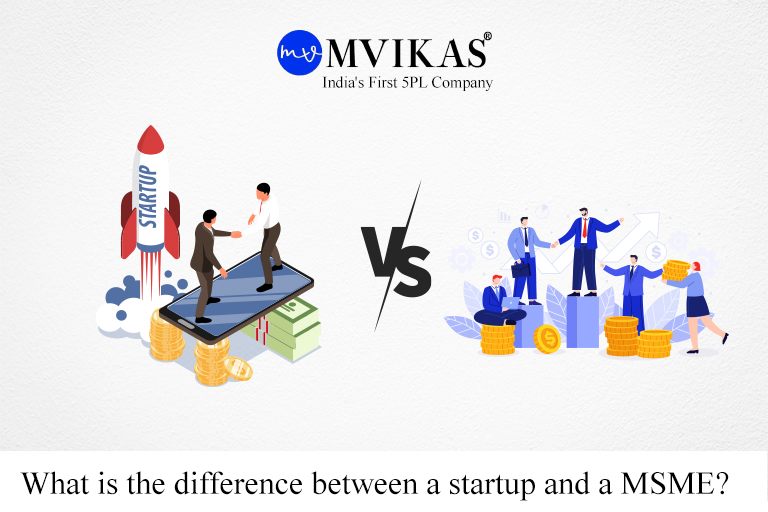
Are you confused about the difference between a Startup and MSMEs?
Well, you have come to the right place!
We will help you to get a clear and concise idea about the difference between these two. Understandably, many need clarification on these two terms and their nature.
So, to understand the difference better, let's delve into the distinctive nature of startups and MSMEs to gain a comprehensive understanding.
Definition: Startup vs MSMEs
Let’s learn the difference between a Startup and MSMEs!
Startups are short-term organisations that are looking for repeating and scalable outcomes. So, let's see what the Government of India have to say. According to the Ministry of Commerce and Industry, startups have been registered for only seven years and have not crossed 25 crore in any financial year. These startups work towards innovation and developing products and services to generate higher employment or wealth.
MSMEs (micro, small, and medium enterprises) are independently owned and operated enterprises designed for profit and sell familiar products to familiar customers in different regional markets.
The Difference Between a Startup and MSMEs
Startups
1. Igniting Innovation and Growth
According to the edition of Inc42's "The Ecosystem" report, the GDP of startups is believed to reach 5-10% by 2030.
Startups are a flame of innovation focused on growing to new heights in the business landscape. The difference between a startup and MSMEs is characterised by vigorously pursuing disruptive ideas, focusing mainly on technology or novel business models.
Unlike the more established enterprises, startups here are typically new, navigating their way towards success and trying to balance risk and reward.
2. Innovation and Risk-Taking
So, when it comes down to startups, they are all about thriving through innovation, constantly pushing their boundaries to bring something new and game-changing to this dynamic market.
They are often risk-takers, as founders start on unexplored territories, and the Startup knows the possibility of failure as a stepping stone to success.
3. Flexibility and Agility
Flexibility is another difference between a startup and MSMEs. The startups are more flexible in adapting to the changing market conditions, pivoting their strategies, and redefining their products or services based on reviews/feedback. So, the agility at the start allows them to stay ahead in this dynamic and competitive environment.
4. Venture Capital and Scaling
Regarding the difference between a startup and MSMEs, startups often seek external funding, frequently from venture capitalists. This injection of capital propels them towards rapid growth and scaling. The goal is not just sustainability but achieving a significant market presence and, ideally, an exit strategy that benefits both founders and investors.
5. Highly Tech-Driven
Technology is the core of many startups. This can be from software development to cutting-edge solutions; technology is often the backbone that propels startups into the limelight. The tech-driven nature of startups allows them to disrupt traditional industries and challenge the status quo.
MSMEs
1. The Backbone of Economic Stability
Do you know the micro, small, and medium enterprises (MSMEs) that form the country's backbone?
One of the first differences between a startup and MSMEs is that MSMEs contribute about 29% to the GDP and 50% of the country's total exports. They contribute significantly to job creation and are responsible for one-third of the country's manufacturing output.
So, unlike startups, MSMEs are often more established, focusing on sustaining operations and serving specific markets.
2. Local Impact and Job Creation
MSMEs are deeply rooted in local communities, contributing to economic stability by creating employment opportunities. So, about 120 million jobs across all industries in India have created employment. Moreover, they cater to the needs of the immediate market, forming an integral part of the economic fabric at the grassroots level.
3. Sustainability and Stability
When it comes to startups, they embrace risk. However, the difference between a startup and MSMEs is that MSMEs focus more on sustainability and stability. It means these enterprises aim for long-term viability, often built on a foundation of established business models.
So, rather than seeking rapid growth, the MSMEs prioritise consistency and reliability.
4. Financing Challenges
Another difference between a startup and MSMEs is financing. Startups rely on venture capital, but MSMEs often need help securing financing.
The traditional lenders may be cautious due to limited collateral, making it essential for MSMEs to explore alternative funding options and government support.
5. Diverse Industries
MSMEs operate across diverse industries, from manufacturing and retail to services. They contribute to the diversity of the business landscape, providing a wide range of products and services to meet the varied needs of consumers.
In Conclusion: Finding Harmony in Diversity
To conclude, you might have a good grasp of the difference between a startup and MSMEs. Though both represent two different phases in the business lifecycle, each has unique characteristics and challenges.
So, startups are the trailblazers, driven by innovation and fueled by risk-taking, aiming for rapid growth and market disruption. On the other hand, MSMEs are the steady contributors that focus more on sustainability, stability, and local economic impact.
While startups and MSMEs may differ in their approaches, they are vital to a thriving Indian economy. Startups infuse dynamism and creativity, challenging the norms and shaping the future. MSMEs provide the stability and economic foundation necessary for sustained growth, fostering community development and resilience.
In a holistic business ecosystem, startups and MSMEs coexist, each playing a crucial role in driving India's economic progress. Their differences complement each other, creating a harmonious balance that drives the nation towards prosperity and innovation.
You May Also Like:
Turning Challenges into Triumphs: MVIKAS Empowers MSMEs
 011-46039993 (Ext. 21 to 32)
011-46039993 (Ext. 21 to 32)
Leave your comment